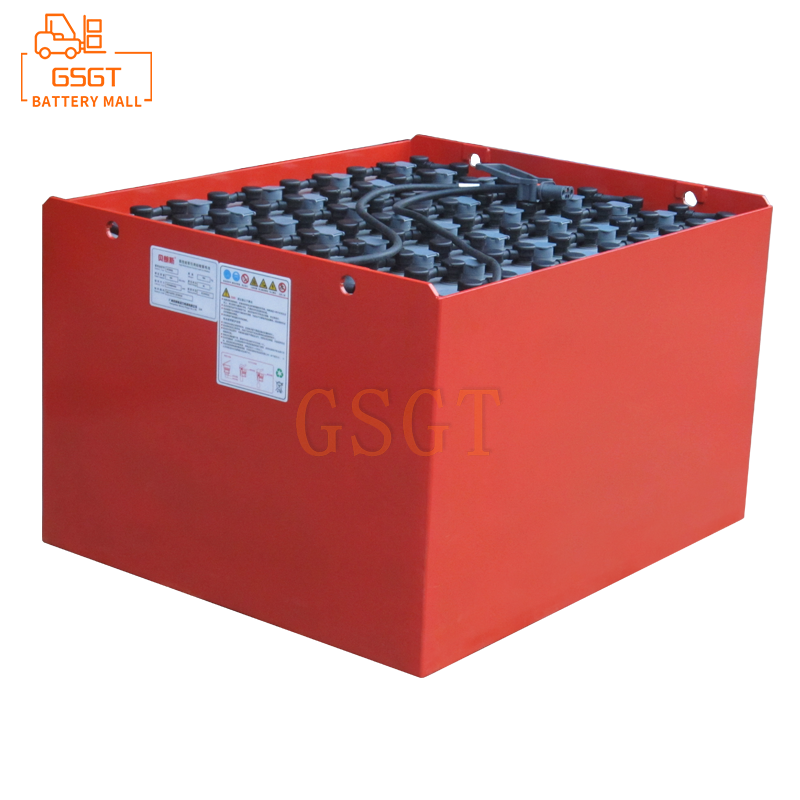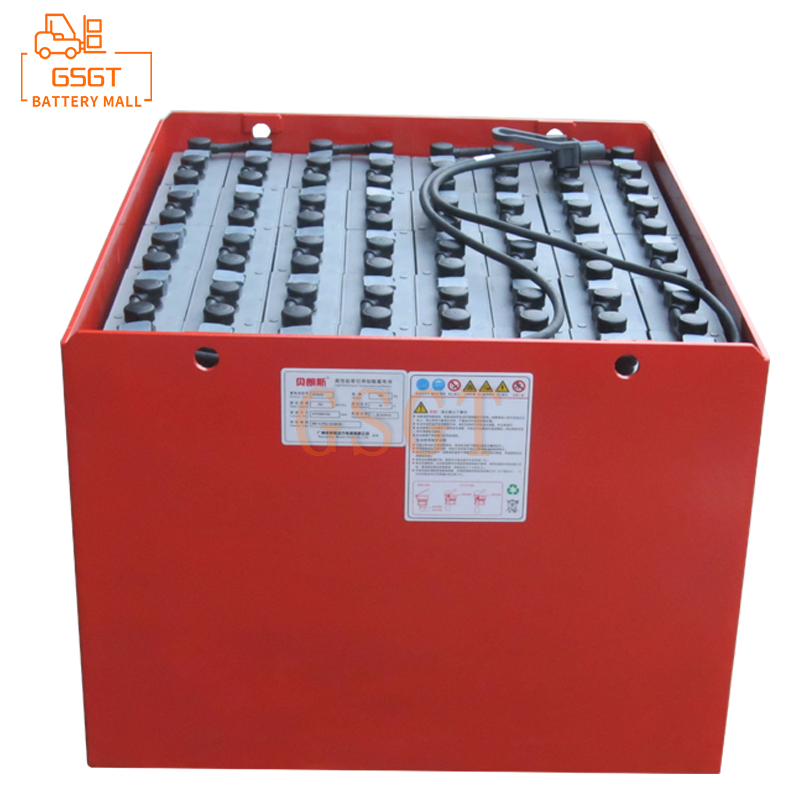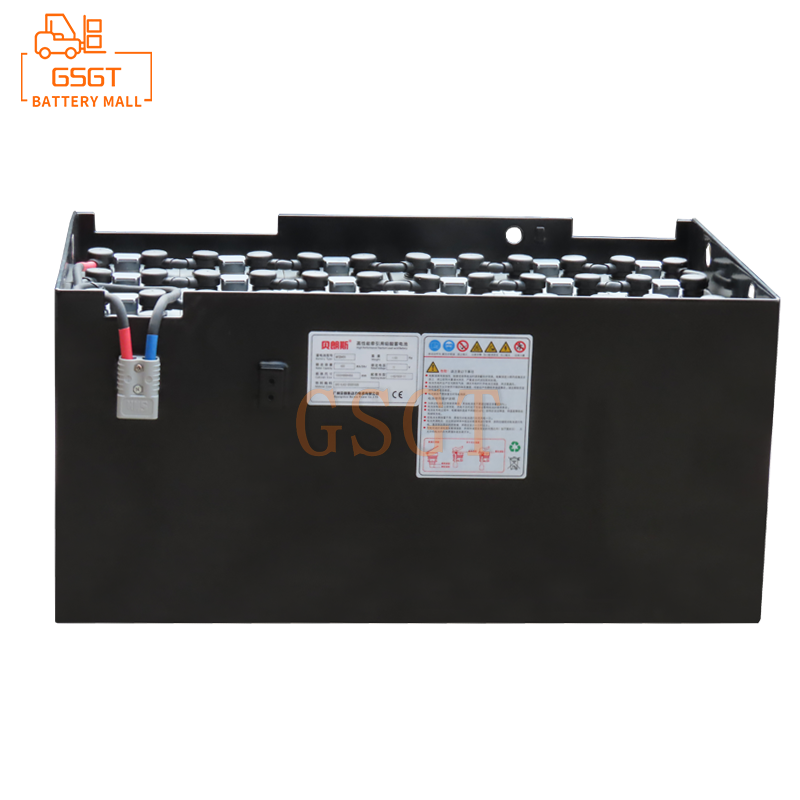Time:2025-06-03 10:16:04
Browse:726
In fields such as logistics and warehousing, and industrial production, forklifts, as important material handling equipment, have a crucial power source. Lead-acid batteries have occupied an important position in the field of forklift power due to their advantages such as mature technology, low cost, high safety and a complete recycling system. There are various types of lead-acid batteries on the market, which differ in voltage, capacity and other aspects to ionally select forklift power, improve operation efficiency and reduce operating costs.
Lead-acid batteries suitable for small forklifts
Small forklifts are typically used in indoor environments with relatively limited space, such as small warehouses, supermarket storage rooms, and small factory workshops. These places have high requirements for the flexibility of forklifts, while the volume of goods handled is relatively small and the load is light.
36V series lead-acid batteries
The 36V series lead-acid battery is a relatively common choice for small forklifts. Its voltage is relatively low, and the output power is suitable for the operation requirements of small forklifts under light load conditions. This type of battery is generally small in size and light in weight, and will not impose excessive burden on the overall structure of the forklift. It can meet the requirements of flexible steering and shuttling of the forklift in narrow Spaces. In the supermarket warehouse, staff use small forklifts equipped with 36V lead-acid batteries to move goods. The batteries can be charged quickly, providing continuous power for the forklifts and ensuring the efficient handling of goods. Its cost is relatively low, making it an economical and practical choice for small enterprises or places with limited budgets and not extremely high forklift usage frequencies.
24V series lead-acid batteries
24V lead-acid batteries are also suitable for some small forklifts that have lower power demands and are smaller in size. For instance, in some warehouses where delicate items are stored, forklifts need to have more precise handling. The low-voltage feature of the 24V battery makes the power output of the forklift more gentle during operation, facilitating precise control of the forklift's movements and avoiding damage to the goods. In some micro factories, due to extremely limited space, small forklifts use 24V lead-acid batteries. These batteries not only meet the demands of short-distance and light-load cargo handling but also are lightweight, thus having low requirements for the structural strength of the forklifts themselves. This reduces the manufacturing cost and maintenance difficulty of the forklifts.
Lead-acid batteries suitable for medium-sized forklifts
Medium-sized forklifts are widely used in logistics and industrial scenarios. Their working environments cover both indoor and outdoor areas. They need to have a certain load capacity as well as good endurance and power performance.
48V/400Ah lead-acid battery
A 48V/400Ah lead-acid battery is one of the commonly used configurations for medium-sized forklifts. A voltage of 48V can provide a relatively stable and moderate power output, while a capacity of 400Ah can ensure that the forklift can work continuously for a certain period of time. This type of battery is suitable for forklift operation scenarios that have certain requirements for space and load capacity. In ordinary logistics warehouses, forklifts need to frequently handle medium-weight goods and travel relatively long distances. A 48V/400Ah lead-acid battery can provide sufficient power for forklifts, enabling them to handle 1-2 tons of goods with ease. Meanwhile, its capacity ensures that forklifts do not need to be charged frequently within one work shift, guaranteeing the continuity of operations. Moreover, the volume and weight of this model of battery are relatively moderate, which will not have a significant impact on the overall design and operational flexibility of the forklift, thus balancing the power performance and space utilization of the forklift.
48V/500Ah lead-acid battery
Compared with 48V/400Ah batteries, 48V/500Ah lead-acid batteries have a higher capacity, which means that forklifts can have a longer driving range. In some large indoor logistics centers, forklifts need to operate continuously in a large area and handle goods frequently. At this point, the advantages of the 48V/500Ah battery are demonstrated. It can reduce the number of times forklifts need to be charged and improve work efficiency. In the warehousing and sorting centers of large e-commerce platforms, forklifts are busy all day long with the transportation and organization of goods. The 48V/500Ah lead-acid battery can keep the forklifts running stably for a long time, eliminating the need to frequently interrupt operations for charging due to insufficient power, which greatly improves the operational efficiency of the entire warehousing and logistics. Although its volume and weight may be slightly larger and heavier than that of a 400Ah battery, it is still within an acceptable range for medium-sized forklifts and can significantly enhance the forklift's operational capacity.
Lead-acid batteries suitable for large forklifts
Large forklifts are mainly used in large cargo distribution centers, such as ports, large logistics parks, and heavy industrial factories. The operational characteristics of these places are heavy cargo, long handling distances, and long operation times, which impose extremely high requirements on the power and endurance of forklifts.
72V series lead-acid batteries
The 72V series lead-acid batteries are often used in large or high-performance electric forklifts. Higher voltage enables the battery to output greater power, meeting the strong power demand of large forklifts when handling heavy objects. At the port, forklifts need to handle several tons of containers and other goods. 72V lead-acid batteries enable forklifts to easily lift and transport these heavy objects, ensuring strong power and stable operation of forklifts under heavy loads. Its high energy density enables a large battery capacity, providing forklifts with a longer driving range and meeting the demands of large-scale operation sites such as ports and logistics parks. Forklifts can travel continuously between different loading and unloading areas for a long time without charging, greatly improving the efficiency of loading, unloading and transportation of goods.
80V series lead-acid batteries
The 80V series lead-acid batteries are suitable for some high-end forklifts with higher voltage requirements and special designs, or forklifts in specific working scenarios. This type of battery can provide higher energy density and more stable power output to meet the working environment with extremely high requirements for forklift performance. In some large steel mills, mines and other places, forklifts not only have to handle extremely heavy goods, but also operate in complex environments, with extremely strict requirements for the power stability and reliability of forklifts. The 80V lead-acid battery can ensure the stable operation of forklifts under such harsh working conditions. Its stable power output can prevent unstable operation of forklifts caused by voltage fluctuations, guaranteeing the safety and efficiency of goods handling. Although the 80V series batteries have a relatively high cost, their outstanding performance makes them irreplaceable in specific large forklift application scenarios.
Lead-acid batteries suitable for special scenarios
In addition to classifying the applicable lead-acid batteries based on the size of the forklift, some special operation scenarios also require specific models of batteries to be compatible.
Explosion-proof lead-acid battery
In some places where flammable and explosive substances exist, such as chemical warehouses and oil refineries, forklifts with explosion-proof functions must be used. Correspondingly, explosion-proof lead-acid batteries need to be equipped. This type of battery has been specially designed and manufactured to effectively prevent the explosion hazard caused by the electric sparks generated during the charging and discharging process. Its shell is usually made of high-strength, flame-retardant and anti-static materials, and the internal structure has also undergone special treatment to ensure safe use in hazardous environments. In the raw material warehouses of chemical enterprises, the use of forklifts equipped with explosion-proof lead-acid batteries to transport chemical raw materials can ensure the safety of the operation process, prevent safety accidents caused by battery problems, and provide a strong guarantee for the safe production of enterprises.
Lead-acid batteries suitable for low-temperature environments
Forklifts operating in low-temperature environments such as cold storage and outdoor areas in cold regions have special requirements for the performance of lead-acid batteries. In low-temperature environments, the fluidity of the electrolyte in ordinary lead-acid batteries deteriorates, the internal resistance of the battery increases, resulting in a decrease in battery capacity and a reduction in charging acceptance. Lead-acid batteries specifically designed for low-temperature environments usually have special additives added to the electrolyte to lower its freezing point and enhance its fluidity at low temperatures. Meanwhile, the plate materials and structure of the battery are optimized to enhance the battery's discharge performance in low-temperature environments. In large cold storage facilities, forklifts need to move goods for long periods in low-temperature environments. Using lead-acid batteries suitable for low-temperature conditions can ensure the normal start and operation of forklifts in low temperatures, guaranteeing the smooth progress of goods handling work. In some outdoor logistics sites in cold regions, such batteries can also keep forklifts in good working condition in low-temperature weather, reducing forklift malfunctions and operation interruptions caused by the impact of low temperatures on battery performance.
Lead-acid batteries of different models for forklifts play a crucial role in various scenarios. When enterprises choose lead-acid batteries for forklifts, they need to comprehensively consider multiple factors such as the type of forklift, working environment, load requirements, and cost, and precisely match the most suitable battery model. Only in this way can the efficiency of forklifts be fully utilized, operational efficiency be improved, and operating costs be reduced. With the continuous development of technology, lead-acid batteries will also continue to be optimized in terms of performance and applicability, providing more reliable and efficient support for the forklift power field.

$10885

$9980

$9525

$2990

MESSAGE
Professional And Efficient
Security
Affordable Price
Professional Services